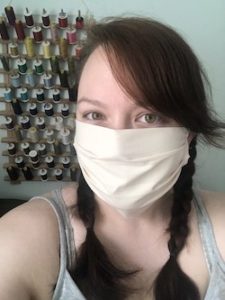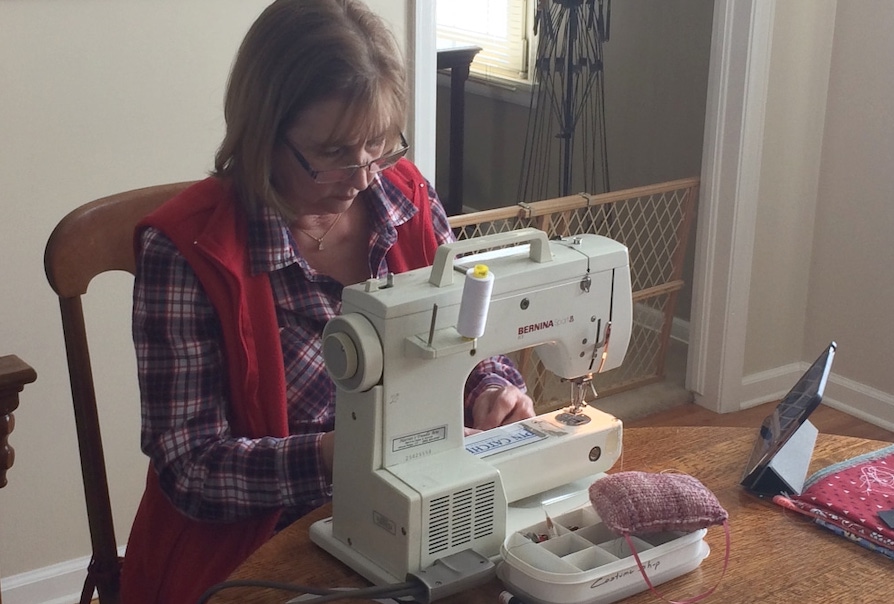Earlier this month, the wardrobe shop at Syracuse Stage was busy putting the final touches on the costumes for Amadeus, which prematurely closed on its opening night. With the growing concerns about the spread of COVID-19, the production run was cut short, the theatre closed, and the brocade waistcoats and ringlet wigs were put into storage. But Syracuse University’s costumers and stitchers were not idle: Last Friday, instead of heading into technical rehearsals for A Grand Night for Singing, the now at-home workers began sewing masks to support healthcare workers combating the novel coronavirus, and facing critical mask shortages.
With theatre marquees dark and wardrobe production at a halt, production staffers across the country are joining the national effort of home sewers to #SewtheCurveFlat. One growing concern around the spread of the coronavirus is the scarcity of masks to protect medical professionals from infected patients; medical masks are direly needed at clinics and hospitals because of the pandemic. The Centers for Disease Control has released criteria for how to make effective handmade masks, and so theatre companies across the country are working with their local government officials and hospitals to devise mask patterns and plans to meet their community’s needs.
Don Buschmann, Syracuse Stage’s director of production operations, was inspired to have the company contribute masks after he saw a post on the Production Managers Forum website asking if theatres could help. “We researched patterns and specifications, got advice from members of our medical community, and are starting to build,” says Buschmann. “It is a work-from-home project, as our building is closed, so there are some logistics that need to be managed. However, my staff has stepped up and offered methods to make this work in a safe and healthy way.”
Fifteen staffers from the costume shop, prop shop, and scenic shop are powering up their sewing machines at home to follow a simple mask pattern. “It’s overwhelming but so worth it,” says Syracuse Stage costumer Gretchen Darrow-Crotty. “We had just come out of a sprint to close a show and the shop before the state was shut down, and I thought this is one thing too many. But then when you’re in it and making the masks in such a short time, you feel really good and you’re doing more than just staying home—as important as that is. The logistics don’t seem to matter so much anymore.”
It takes about 10 minutes to sew together two swatches of tightly woven cotton fabric and two pieces of elastic. With just the supplies on hand, the theatre estimates it can produce about 500 masks. “We buy in bulk, so when this idea took off last week, and elastic became scarce right away, we knew we could help,” says Darrow-Crotty, noting that the theatre buys 1,000-yard spools of elastic.
The Chicago theatre community, which has not yet been instructed to make medical masks from the Chicago Department of Health, is ready to kickstart mask production if requested. For now, companies are providing support with donations of materials. Says Scott Conn, production manager of the Goodman Theatre says, “In the meantime we, along with many other theatre and performing arts organizations around the city, have organized a donation on a variety of the PPE [personal protective equipment] that hospitals, health care workers, and first responders are in need of.” The theatre has donated N95 masks, gloves, disinfecting wipes, and Lysol spray, all products that the production team has stocked for the theatre employees.
TheatreWorks Silicon Valley in Mountain View, Calif., has also donated safety supplies from its overstock. N95 masks, used during construction of sets, and Nitrile gloves, which staffers wear for glue application and general protection, were donated to the San Jose Valley Medical Foundation.
It’s not just the coveted materials and sewing skills that make theatre production staff poised for this task, though. It’s also the resourceful, bootstrap spirit of the theatre community writ large.
“I’ve always felt that the role of art in civilization is to help us see our world differently,” says Bushmann. “Whether that is to understand and appreciate others more, or to motivate us to change that which is wrong. To see our team galvanize around an issue and apply their skills to help change a difficult situation is extraordinarily refreshing and uplifting.”

In Atlanta, the Alliance Theatre has also pivoted production to churn out medical masks. There are 11 costume shop staffers, plus employees from other departments, now making masks from home. The company’s goal is to make 20 masks per day, per person, so that approximately 220 masks will be produced daily from the ad hoc team. “The masks are being made out of basic cottons that are lightweight enough to breathe through,” explains Spencer Henderson, director of costume shop and wardrobe. “Our masks are intended to be used to cover N95 medical masks, this extends the life of actual medical masks.”
The project was set in motion last week after a Metro Atlanta Chamber of Commerce meeting called for medical supplies. The Chamber of Commerce connected the Alliance Theatre with multiple hospital supply chain managers to begin planning the mask production. “Once initial contact was made between the organizations, we made several prototypes that we submitted for approval,” says Henderson. “Once we had that approval, we were able to begin in earnest.”
Meanwhile a team of 10 volunteers from the Denver Center for the Performing Arts (DCPA) is working through the company’s stash of fabric scraps from past productions to craft masks. Kits comprising fabric and tools from the costume shop have been made available for the volunteers to support their work-from-home sewing efforts.
“We’re all home stitching away,” says DCPA costume crafts director Kevin Copenhaver, noting that some of the company’s props staff will be joining the effort too. “One thing that I’ve been sort of stressing is that it is quality over quantity—we’ve landed on a pattern that has been the best choice, for us at least, and we’re all following the same guidelines.”
For his part, Copenhaver is grateful for the opportunity to help do something productive while the city of Denver is on lockdown. “It’s a project that is worthwhile,” he says. “We have these skills, and if there’s anything we can do to help out, it is incumbent on us to do so.”

In New York City, an epicenter of the pandemic, healthcare workers are in need of more than just masks—hospitals need an estimated 10 million surgical gowns. To help spearhead volunteer requests from the Broadway community, the Governor’s Office enlisted the help of Jeff Whiting, the CEO/president of Open Jar Studios, a rehearsal space in the heart of Times Square. The two 4,000-square-foot rehearsal studios have now become a delivery hub for fabric and materials.
Whiting, along with the Broadway Green Alliance and actorJavier Muñoz, have launched the Broadway Relief Project to put out-of-work Broadway costume designers and stitchers to work. So far, more than 250 people have volunteered, and the Broadway Relief Project estimates that it can provide 14,000 gowns.
“We have so many tailors, stitchers, and sewers who work on Broadway available, so we’re just organizing to get materials to their homes,” says Whiting. The Broadway Relief Project is planning a pick-up and drop-off system that will be able to deliver materials to the homes of volunteers in the New York City area, and get the finished surgical gowns to the local hospitals in need.
“On Broadway, we specialize in doing the impossible,” says Whiting. “Now we’ve been relegated to sitting at home and do nothing—but this is something that we can do, and we can still do it while being safe. It’s providing a great need.”


